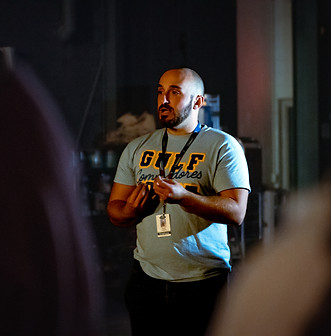
Vincent Pelligrino
Current appointment
Assistant Professor of Theatre
Gulf Coast State College Panama City, FL 2021-Present
Former Appointments
Adjunct Professor of Theatre
Broward College 2020-2021
Adjunct Professor of Theatre
Regent University 2017-2020
Head of Musical Theatre
Chattanooga Center for Creative Arts 2016-2017
Graduate Teaching Assistant
West Virginia University 2012-2015

"Vince was an overall amazing professor. He did all he could to make sure, at the end of the semester, we all learned how to become better actors. He was one of my favorite professors.
It was a really fun class! I feel like I learned a lot about how to act and that I gained a lot of confidence performing in front of people."
"Vince is really friendly and very enthusiastic! You can tell he loves acting and is genuinely interested in seeing others grow in this area."
"Always available and prepared for class. Kept things very interesting and enjoyable. Really cared for students."
"He is very passionate about what he is teaching and made it fun to learn. Just an excellent teacher. Never wanted to go to a class so much in my life."
Teaching Strengths
-
Acting (methods from Stanislavski, Meisner, and Viewpoints)
-
Musical Theatre
-
Script Analysis
-
Directing
-
Theatre Appreciation
Teaching Philosophy
These are the core values and standards to which I hold myself, and instill in my students. Demonstrating these qualities sustains performers to carry themselves through the challenges of the industry with dignity and self-actualization.
Value 1: Process Over Product
It is important to remember that during their journey of study the student is not a product, but a work in progress. When the student discovers and embraces this process, they unlock their unique power.
Value 2: Triple Threat +
Musical Theatre performers are expected to be “triple threats” possessing equal talent in singing, dancing, and acting. Preparation and discipline are key elements to creating a triple threat. Through practice the student will develop additional skills such as time management, organization, and representing and man- aging their own career. Success will come when the student’s talent and drive meets the right opportunity.
Value 3: Collaboration
Part of being a triple threat + is possessing the ability to collaborate. Students who work together to create art, and who receive and respond to feedback with humility are more likely to do so in the professional world. Building the spirit of ensemble in the classroom is the cornerstone of collaboration.
Value 4: Failure and Accepting Defeat
There is no shame in making mistakes, only in repeating them. In art, failure can lead to inspiration and defeat can lead to new beginnings. Lori Hammel writes in Minding The Edge, “It was someone else’s turn, and mine is coming.” Accepting defeat is something all artists must do. The student must find a way to rise from defeat and become resilient if they intend to enter the professional world.
Value 5: Go Above and Beyond
As a self-employed artist, doing the minimum is insufficient. Students demonstrate proficiency when they go above and beyond the requirements of the assignment and take their study even further.
Value 6: You Don't Have To Be Cool
Larry Moss writes in The Intent to Live: “Be mad! Be witty! Be loving! Be heartfelt! Be sunny! Be fierce- ly cold! But, [please], don’t be cool!” The acting student must be the truest version of themself and be passionate about what they want to do. I will advise my students that chasing a trend or trying to squeeze themselves into an archetype is often futile. It is more fulfilling for the student to follow their individual passion, embrace their unique qualities, and define their own version of success.
Value 7: Kindness and Grace
I elevate and encourage students to aim higher without minimizing their accomplishments. While holding students to a high standard of excellence I practice kindness and grace in every effort, every collaboration, and every situation. I teach from a place of positivity knowing that every student has different talents and abilities, and strive to inspire them to continue growing as an artist.